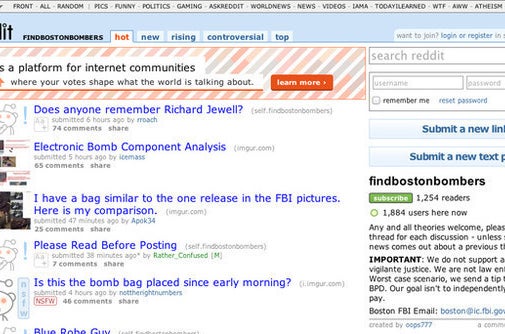
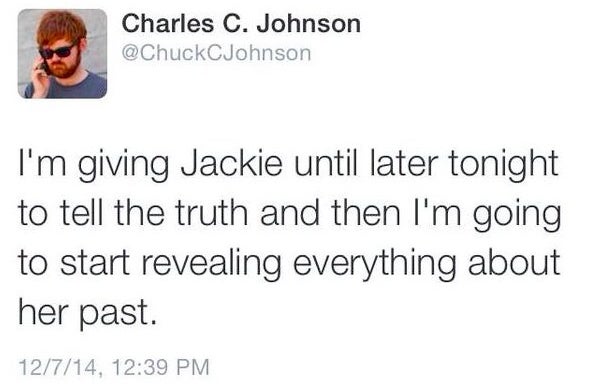
Citizen journalism was one of the great dreams of the mid-2000s internet. Just as blogs had given anyone with an internet connection and a keyboard a platform, media companies like AOL and CNN hoped that cell phones and high-speed internet would transform an army of private citizens and online hobbyists into freelance, oftentimes pro bono writers, videographers, and reporters.
Eight years and countless failed ventures (CNN's iReport, AOL's Patch) later, that dream is almost unrecognizable — more powerful, and at times darker, than the seers and corporate executives imagined. Today's citizen journalism is not owned by any one major media conglomerate; instead, it takes place across the social web and in anonymous message board communities across the internet. It has a vast new subject matter in the personal, corporate, and government information that has migrated to the social web. But in many instances, citizen journalism is something like the more troubling idea of citizen policing — that is, vigilantism: taking the powerful, and even dangerous tools of journalism to the communities with the least responsible actors. At its very best, it gives voice to the disenfranchised. At its worst, it ruins lives.
The first time I really, truly noticed it was around 4 a.m. on July 20, 2012. I'd come home from a midnight showing of The Dark Knight Rises to news of a tragic movie theater shooting in Aurora, Colorado. I watched my Twitter feed, which was moving feverishly, considering the hour, spitting out information at a rapid clip. As is usually the case in the immediate moments following a tragedy, local news outlets were doing most of the groundwork before the national correspondents and cable networks descended. That night, however, my feed was dominated by links to Reddit, where an 18-year-old student from Denver named Morgan Jones spent the night chained to his dual monitors, exhaustively collecting and dutifully updating a Reddit thread with posts from local media, police scanners, and on-the-ground social media posts. Working fast, but carefully, Jones found a Reddit post from a user who'd been shot that night and had posted a photo of his wounds, beating local and national media to the story hour after hour.
In the hours and days after Aurora, media reporters — myself included — spoke to Jones and Reddit about this seemingly new style of citizen journalism, fueled by social media and aided by an intimate familiarity with news cycles and the internet. Reddit was cautiously excited about this development; then-general manager Erik Martin told me that "what is on the news isn't always the story that people want to talk about and be involved with. On this site, you can get into and explore what you're truly interested in."
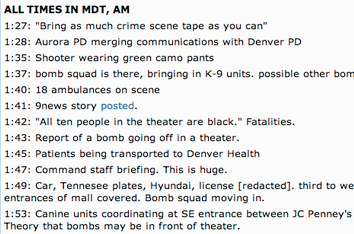
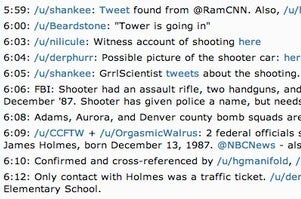
Screenshots from Jones' Reddit thread.
The next day, Jones' thread found an Adult Friend Finder profile that seemed to belong to the shooter, James Holmes, that had gone unfound by legacy outlets. More traditional media pundits blustered (somewhat rightly) about the dangers of news gathering from nonprofessional sources; outlets that reported on the Adult Friend Finder profile did not credit Jones or Reddit. "It was sort of a strange feeling, like Reddit's supposed to be this aggregate news site, but we're actually breaking news to the media right now," Jones told the New York Times.
Jones was by no means the first citizen journalist to use an online platform to elevate his voice and contribute reporting to scoop legacy media (similar news-gathering Reddit threads existed far before Jones'), but the high visibility of Jones' thread, coupled with the fact that his careful work turned up few hoaxes and spread credible information, seems to mark a turning point for internet-based citizen news gathering.
Since Jones' thread, this online behavior has metastasized through social news sites like Reddit and online anonymous message boards like 4chan. Moving well past traditional news gathering, this breed of vigilante investigations has fractured into cells that defy categorization. They are, case by case, conspiratorial and careful; methodical and reckless; helpful and irreconcilably damaging.
And they're growing in popularity.
After Aurora, other Reddit threads attempted to do similar work; just a month after the Colorado shooting, a popular thread collected on-the-ground information via social media in the aftermath of a shooting outside the Empire State Building. The tragedy at Sandy Hook in late 2012 spawned numerous message board threads — some helpful, some heinous — to try to cover the mass shooting. The most infamous example came in April 2013 when the r/findbostonbombers subreddit launched an exhaustive and reckless manhunt that resulted in the spread of damaging misinformation that soon found its way to the New York Post's front page.
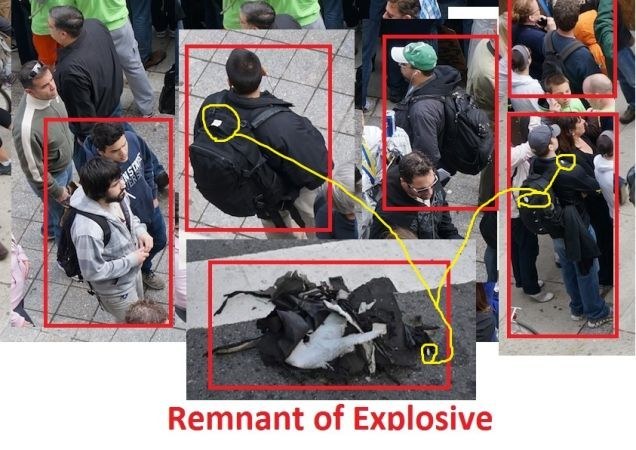
While the Boston bombing Reddit disaster tempered media optimism toward of the online citizen investigative complex, its high profile was a clear signal to the anonymous practitioners of vigilante "journalism": True or not, their voices were a dominant part of the greater media landscape. As my colleagues here at BuzzFeed wrote in the aftermath of the Boston Marathon manhunt, the media had to grapple with the notion that it doesn't own the story anymore; that "it's time for the press to start guiding readers through the sea of information — and stop pretending there's only one narrative."
It's this mentality of addressing all corners of the internet's reporting machine — even its deepest, darkest, and most conspiratorial — that has given way to the rise of the viral debunk, a new breed of fact-checking for a breakneck news cycle with any number of unvetted sources.
This same acknowledgement — that the media no longer owns the story — has simultaneously provided momentum to the internet's growing legion of amateur detectives and uncredentialed investigative reporters. They're players in nearly ever major internet scandal of 2014: the online manhunt for Bryan Hamade, the man believed to have leaked Jennifer Lawrence's nude photos and sparked "The Fappening"; the sexual-harassing, doxxing, ethics crusading online Hydra behind GamerGate; the cold-case internet sleuthing inside the Serial podcast subreddit (which had 24,943 subscribers as of this writing); and, most recently, the troubling outing of the alleged victim behind Rolling Stone's now-bungled UVA campus rape story by a former writer turned internet troll.
As the vigilante journalism and investigations continue to propagate online, they seem to move further and further away from Jones' admirable, proudly amateur news gathering. Jones told BuzzFeed the day after the Aurora shooting that his goal was not to gain notoriety or further a political agenda. "It feels like I'm helping out people who need to know this stuff," he said. Jones' aims, in other words, were well-intentioned; he wanted to work with the media, not in spite of it.
Roughly 30 months later, the paradigm seems to have shifted. The rise of the vigilante investigation now seems undergirded by the internet-utopian idea that any and all information should be free and that those with the digital means to procure that information should be compelled to expose it. Standards and practices rarely exist (save for a halfhearted "don't doxx" maxim in communities like Reddit); ethics are secondary concerns and reputation is rarely in jeopardy, thanks to the protective veil of online anonymity. Victory often goes to the actor most willing to do harm, to be wrong, or both.
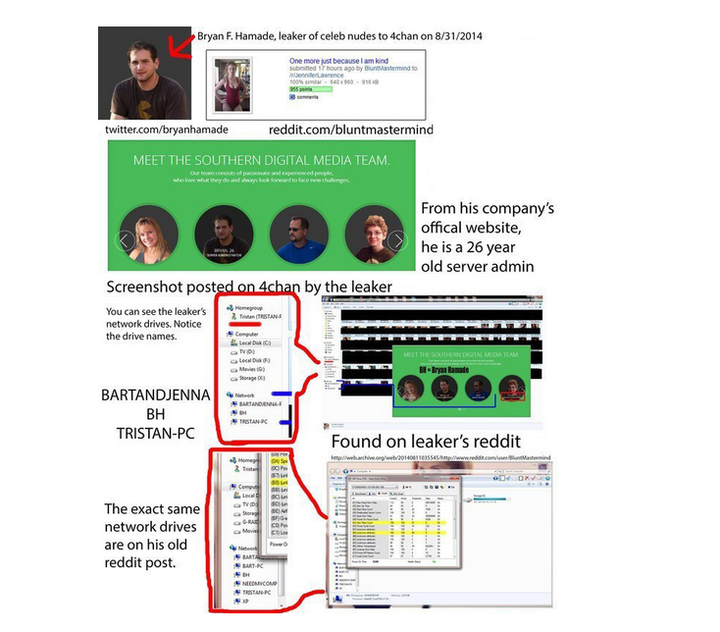
As a result, these investigations seem to grow increasingly conspiratorial and reckless. They've adopted their own aesthetic that Sam Biddle at Gawker recently coined as "Chart Brut," a "simple, unrefined, urgent, ominous, striving to be informative, and utterly incomprehensible...digital middle-ground between the string-and-thumbtack cork-board flowcharts favored by premium-cable obsessives like Rust Cohle and Carrie Mathison, and the meaningless tangles of agency responsibilities beloved by security-apparatus bureaucrats, and it's emerged as the defining folk aesthetic of the 2014 internet."
This style perfectly describes the investigative phenomenon that gave it life: It's often childish, convoluted, at times impressive, slipshod, obsessive, and slightly frightening.
None of which is to say that the media establishment is infallible — the rise of the vigilante investigation and record-low levels of public distrust of media is surely no coincidence. The internet's uncanny ability to add fuel to the fire of our cultural obsessions no doubt plays a role as well. Social media, often fueled by citizens on the ground, has proven itself invaluable during breaking news for years, and role of the citizen journalist is likely to play an increasingly visible role in the current media ecosystem for some time now. Social media will continue to give oxygen to new events and movements like Ferguson, which may never have reached the greater public without it.
But with that boon also comes the rise of an ugly new truth: that anything that can be reported will be reported, even when it's the protected identity of a college-aged rape victim by a quasi-journalist with a history of suspect reporting and bizarre public statements. It's the rise of doxxing as a political weapon — identifying specific targets and revealing personal information so an online mob can descend on them.
Though he once worked for a known media outlet, Jackie's doxxer is now, like so many of the vigilante online detectives across Reddit, 4chan, and other communities, in his own line of work. He, like those in r/findbostonbombers or the Serial podcast subreddit, have no job to lose, either because they are self-employed or anonymous.
Depending on where you fall along the moral and ethical lines drawn by this type of vigilantism, citizen journalism is arguably weaker or stronger than it's ever been. What's harder to argue, however, is how starkly the promise of citizen journalism has changed from the hope that more eyes will mean more accountability and better news...to the reality that information has never been freer or more fully weaponized. Those who know Jackie's doxxer told the Washington Post that he's "he's driven by "scalps." But the motivation is unimportant. The only thing that's important is that the tools are there for any and all to use.
